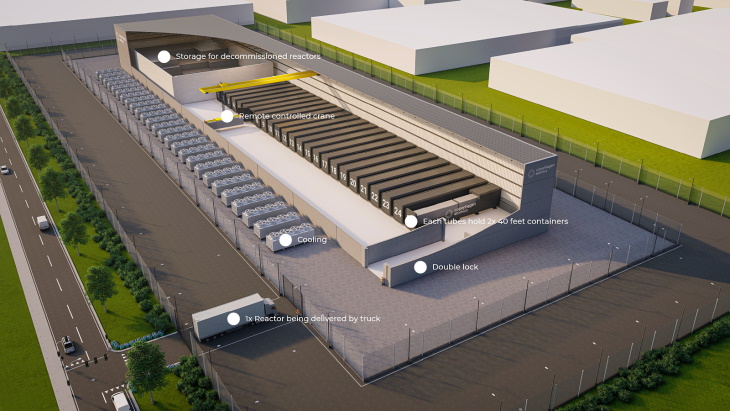UK Atomics - a subsidiary of Denmark's Copenhagen Atomics - has submitted a Generic Design Assessment (GDA) entry application for its small and modular thorium molten salt reactor to the UK Department for Business, Energy and Industrial Strategy (BEIS).
A visualisation of a 1 GW plant based on Copenhagen Atomics' molten salt reactor (Image: UK Atomics)
GDA is a process carried out by the Office for Nuclear Regulation (ONR) and the Environment Agency (EA) to assess the safety, security, and environmental protection aspects of a nuclear power plant design that is intended to be deployed in Great Britain. Successful completion of the GDA culminates in the issue of a Design Acceptance Confirmation from the ONR and a Statement of Design Acceptability from the EA. In May 2021, BEIS opened the GDA process to advanced nuclear technologies, including small modular reactors (SMRs).
UK Atomics has now applied for its containerised molten salt reactor to be put through the GDA process. Moderated with unpressurised heavy water, the reactor consumes nuclear waste while breeding new fuel from thorium. Small enough to allow for mass manufacturing and assembly line production, the reactor has an output of 100 MWt.
"The reactor design utilises innovative technologies to generate energy through a thorium molten salt reactor, enabling clean, reliable and cheap energy for the world," the company said. "This technology has the added benefit of producing no greenhouse gas emissions and it does consume long-term nuclear waste from the classic nuclear industry to produce energy."
A prototype reactor has already been constructed at a new facility in Copenhagen which "will be tested to support the goal-oriented approval process".
"We are thrilled to be taking this important step towards bringing our groundbreaking technology to market," said UK Atomics CEO and cofounder Thomas Steenberg. "We believe this reactor has the potential to greatly reduce our reliance on fossil fuels and make a significant impact on the green transition, and for the UK to provide jobs and prosperity."
According to Copenhagen Atomics, the reactors will be deployed by UK Atomics, who will build, own and operate a fleet of autonomous reactors, "eventually numbering in thousands". This business model, selling energy-as-a-service, will enable a cost-effective and low-risk deployment.
The first commercial reactor is scheduled to begin operating in 2028.
The company said that with low operating costs and no capital expenditure to the customer, it projects an electricity price point below GBP40 (USD48) per MWh. "This price is very competitive and will create a new affordable energy source that can drive the energy transition for the world," it said.
"We are removing the complexity for decision makers," said Copenhagen Atomics cofounder Thomas Jam Pedersen. "Companies fear the responsibility of operating a nuclear plant, decommissioning, and handling nuclear waste. We take care of all of that and just deliver reliable and green energy to the customer."
"UK Atomics' application for its 'waste burner' design is an exciting step forward for next generation nuclear in the UK," said Nuclear Industry Association Chief Executive Tom Greatrex. "It offers another innovative way of producing abundant clean energy to ensure energy security and hit our net-zero goals. The UK can and should be leading the deployment of these types of technologies, and we look forward to seeing progress in the days ahead."
Rolls-Royce SMR was the first vendor to submit an application for a GDA of an SMR design. The 470 MWe pressurised water reactor design was accepted for review in March 2022 with BEIS asking the ONR and EA to begin the process.
In December, GE Hitachi Nuclear Energy submitted a GDA entry application for its BWRX-300 SMR, while Holtec International said it intends to soon submit an application for its SMR-160 design.
